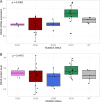Elevated KRAS protein level is associated with better survival in pancreatic cancer
- PMID: 40596921
- PMCID: PMC12211309
- DOI: 10.1186/s12885-025-14461-w
Elevated KRAS protein level is associated with better survival in pancreatic cancer
Abstract
Background: Activating somatic KRAS mutations in hotspot loci occur almost universally (> 95%) in pancreatic ductal adenocarcinoma (PDAC). Both the presence of a KRAS mutation and high mRNA expression levels of KRAS in tumor tissue have been associated with worse outcome. Less is known about the expression of KRAS at the protein level and its association with clinical and molecular parameters. In the present study, we investigated the prognostic significance of the KRAS protein level and its relation to KRAS mutation status and the mRNA expression level.
Methods: A total of 41 PDAC tumors were screened for seven KRAS mutations (p.G12D, p.G12V, p.G12R, p.G12C, p.G12S, p.G13D, p.G12A) by the Wobble-enhanced ARMS method. Whole transcriptome and proteome profiles were obtained using mRNA microarrays (Agilent) and quantitative mass spectrometry-based proteomics (HiRIEF LC-MS/MS), respectively. The clinical outcome was overall survival (OS).
Results: KRAS mutations were identified in 88% of the tumors with p.G12D and p.G12V mutations being the most frequent. Tumors with p.G12V mutation had significantly higher KRAS mRNA expression than tumors with p.G12D, p.G12C, p.G12R or no mutation identified (P < 0.01). KRAS protein levels did not associate significantly to neither KRAS mRNA levels (Spearman's rho = 0.18, P = 0.28) nor type of KRAS mutation. High KRAS protein level and mutation p.G12V were found to be significantly associated with better (P < 0.01) and worse OS (P < 0.05), respectively.
Conclusions: The KRAS protein level correlated poorly with KRAS mRNA expression level and was not significantly associated with the type of mutation present. Interestingly, we found that patients with high KRAS protein level in their tumors had a better clinical outcome.
Keywords: KRAS mRNA expression; KRAS mutation; KRAS protein level; PDAC; Pancreatic cancer.
© 2025. The Author(s).
Conflict of interest statement
Declarations. Ethics approval and consent to participate: The patients were included in the specific biobank at Oslo University Hospital entitled “Thematic Research Area Pancreatic Cancer”. This study, linked to the specific biobank, was approved by the Regional Committee for Medical and Health Research Ethics with reference REK 2015/738. The patient’s informed signed consent covers collection and analyses of biological material in addition to clinical information. The research was conducted in accordance with the WMA Declaration of Helsinki. Consent for publication: Not applicable. Competing interests: The authors declare no competing interests.
Figures




Similar articles
-
KRAS Mutation Status and Treatment Outcomes in Patients With Metastatic Pancreatic Adenocarcinoma.JAMA Netw Open. 2025 Jan 2;8(1):e2453588. doi: 10.1001/jamanetworkopen.2024.53588. JAMA Netw Open. 2025. PMID: 39777438 Free PMC article.
-
Application of plasma circulating KRAS mutations as a predictive biomarker for targeted treatment of pancreatic cancer.Cancer Sci. 2024 Apr;115(4):1283-1295. doi: 10.1111/cas.16104. Epub 2024 Feb 13. Cancer Sci. 2024. PMID: 38348576 Free PMC article.
-
ADT-1004: a first-in-class, oral pan-RAS inhibitor with robust antitumor activity in preclinical models of pancreatic ductal adenocarcinoma.Mol Cancer. 2025 Mar 13;24(1):76. doi: 10.1186/s12943-025-02288-9. Mol Cancer. 2025. PMID: 40082968 Free PMC article.
-
K-Ras mutation detection in liquid biopsy and tumor tissue as prognostic biomarker in patients with pancreatic cancer: a systematic review with meta-analysis.Med Oncol. 2016 Jul;33(7):61. doi: 10.1007/s12032-016-0777-1. Epub 2016 May 25. Med Oncol. 2016. PMID: 27225938
-
Prognostic utility of preoperative and postoperative KRAS-mutated circulating tumor DNA (ctDNA) in resected pancreatic ductal adenocarcinoma: A systematic review and meta-analysis.Surg Oncol. 2023 Dec;51:102007. doi: 10.1016/j.suronc.2023.102007. Epub 2023 Oct 10. Surg Oncol. 2023. PMID: 37852124
References
-
- Siegel R, Naishadham D, Jemal A. Cancer statistics, 2013. CA Cancer J Clin. 2013;63(1):11–30. - PubMed
-
- Kleeff J, Korc M, Apte M, La Vecchia C, Johnson CD, Biankin AV, et al. Pancreatic cancer. Nat Rev Dis Prim. 2016;21(2):16022. - PubMed
-
- Cancer Registry of Norway. Cancer in Norway 2022- Cancer incidence, mortality, survival and prevalence in Norway Cancer Registry of Norway. 2023. Available from: https://www.kreftregisteret.no/globalassets/cancer-in-norway/2022/cin_re.... Cited 2022 Nov 15.
-
- Al-Shaheri FN, Alhamdani MSS, Bauer AS, Giese N, Büchler MW, Hackert T, et al. Blood biomarkers for differential diagnosis and early detection of pancreatic cancer. Cancer Treat Rev. 2021. 10.1016/j.ctrv.2021.102193. - PubMed
MeSH terms
Substances
Grants and funding
LinkOut - more resources
Full Text Sources
Medical
Miscellaneous

